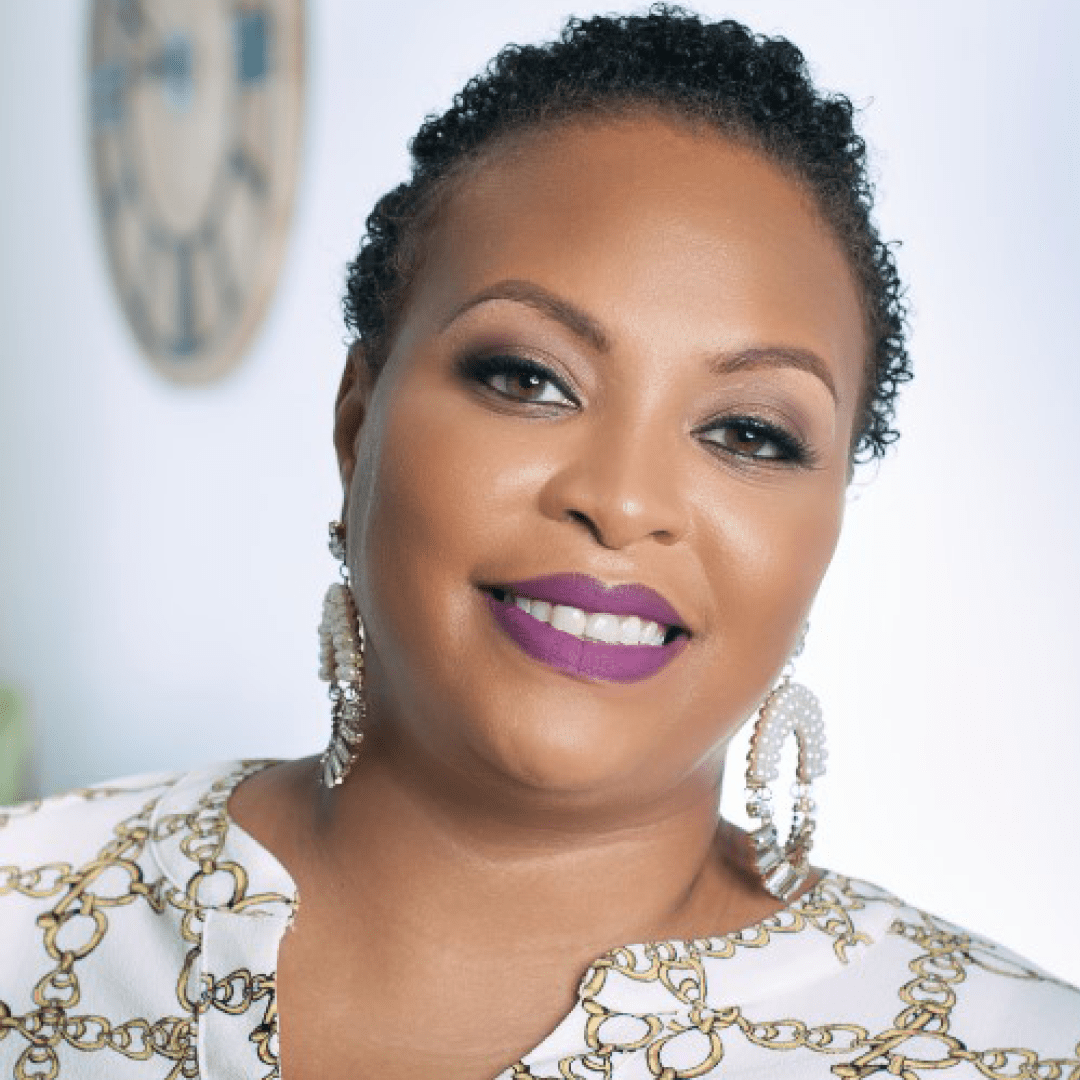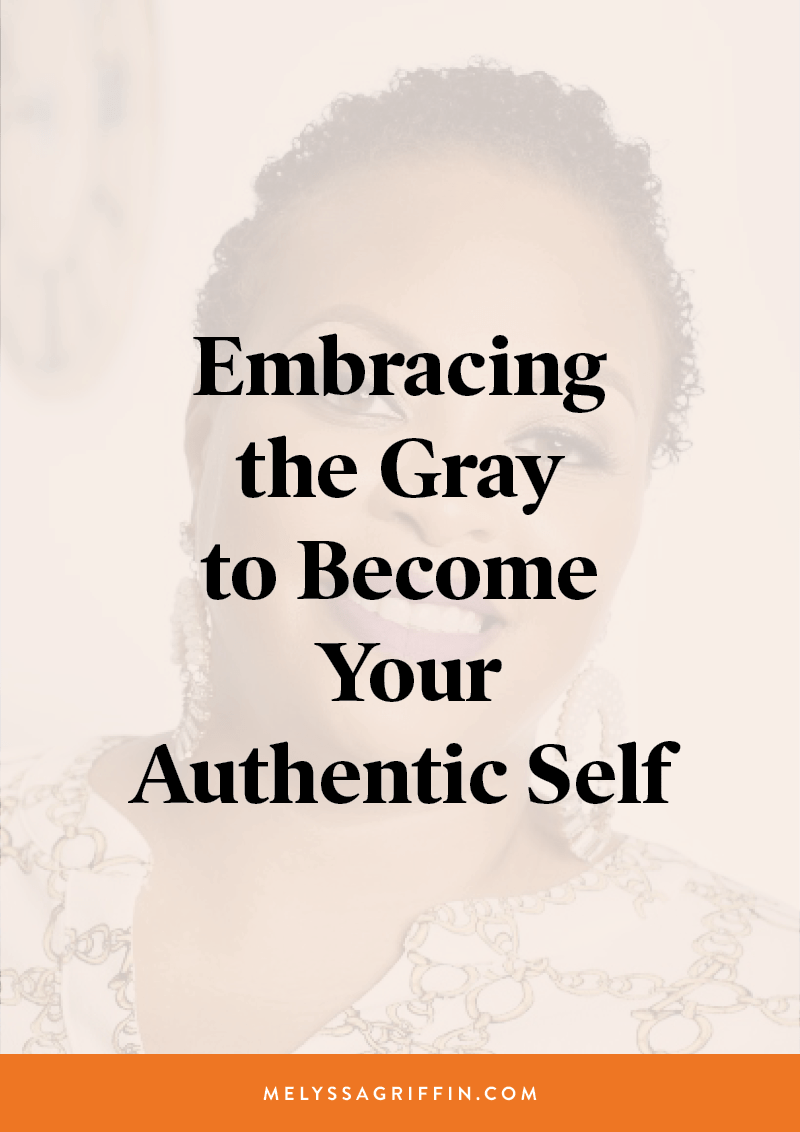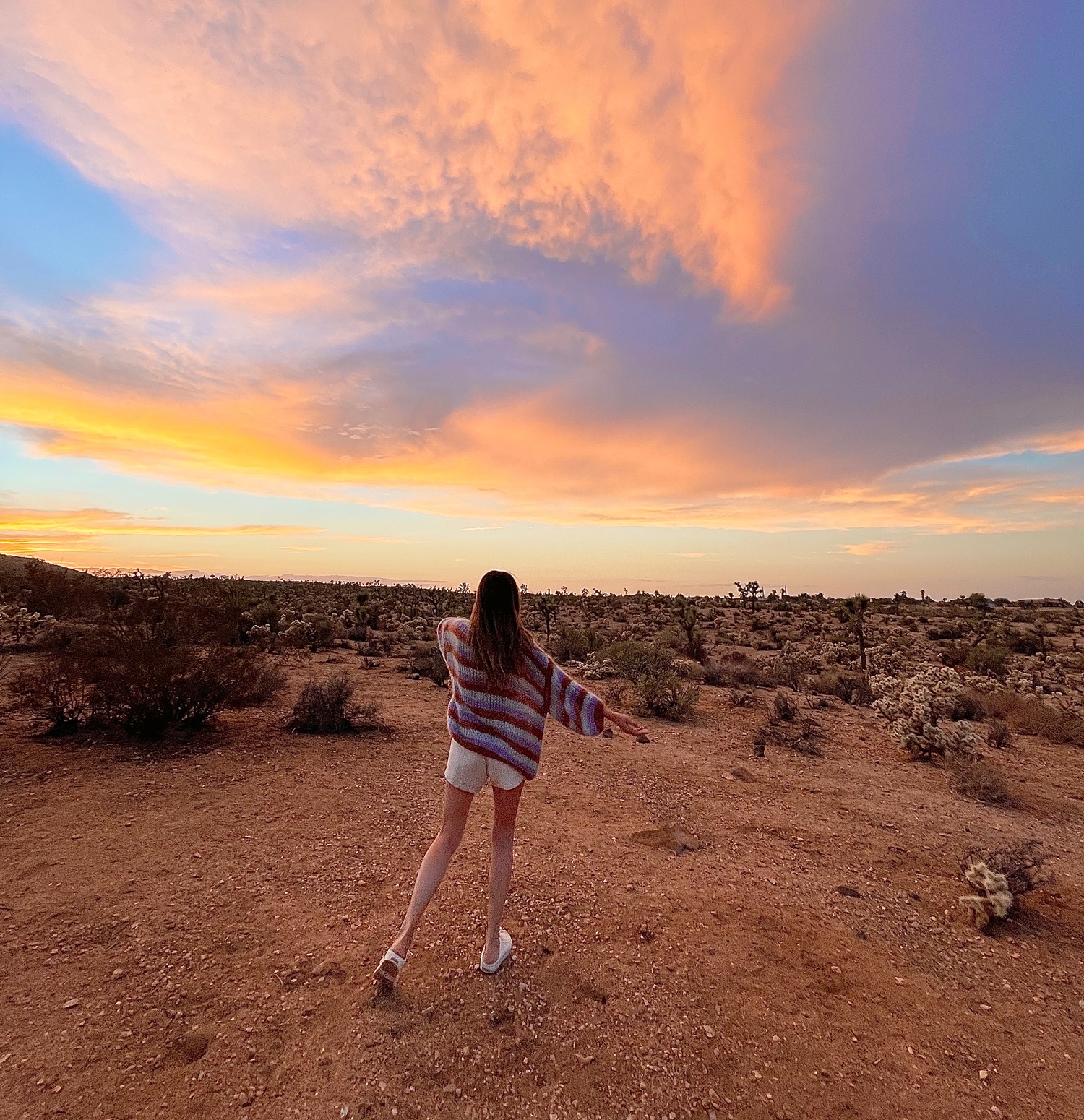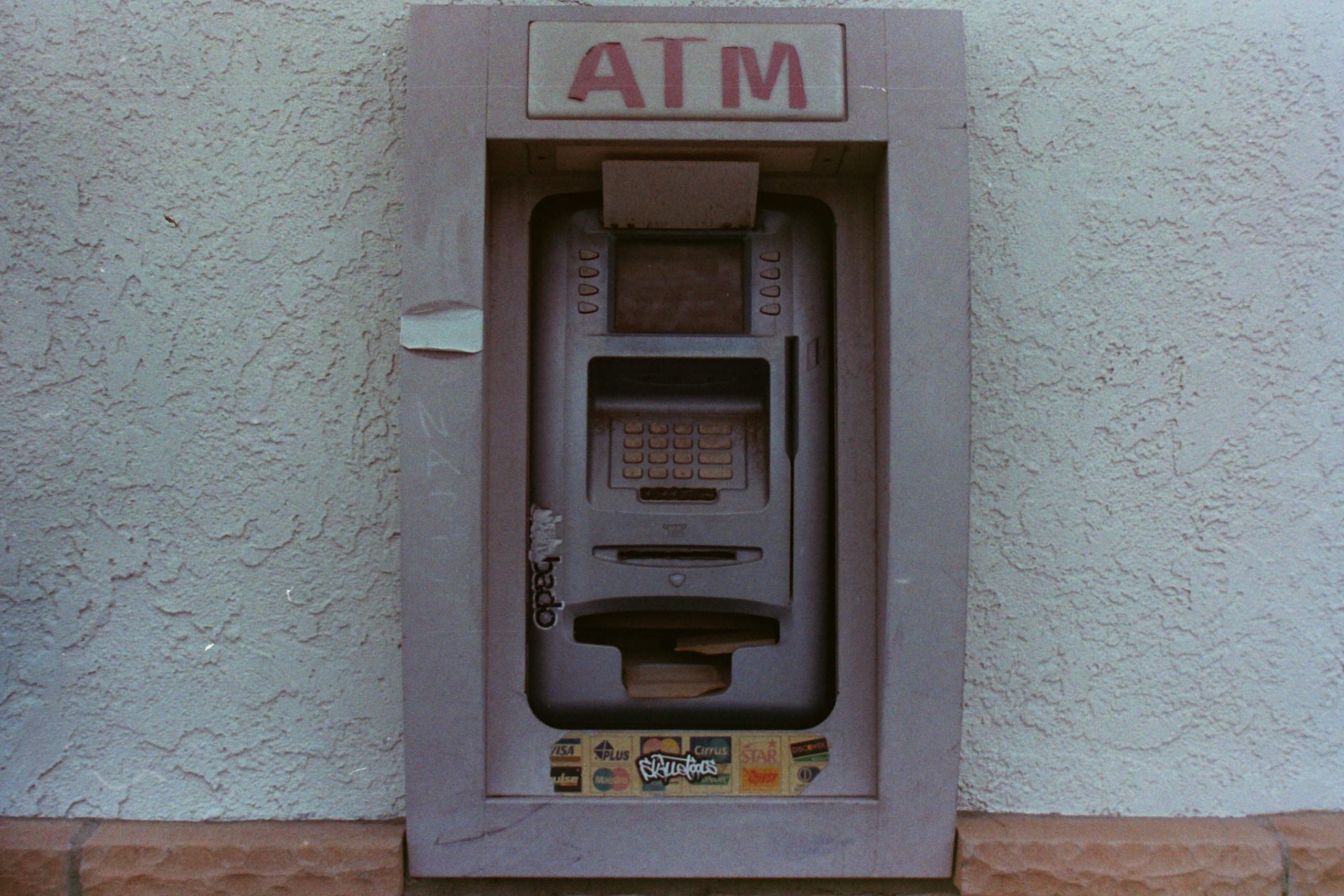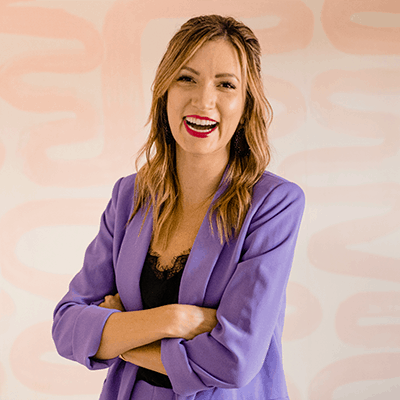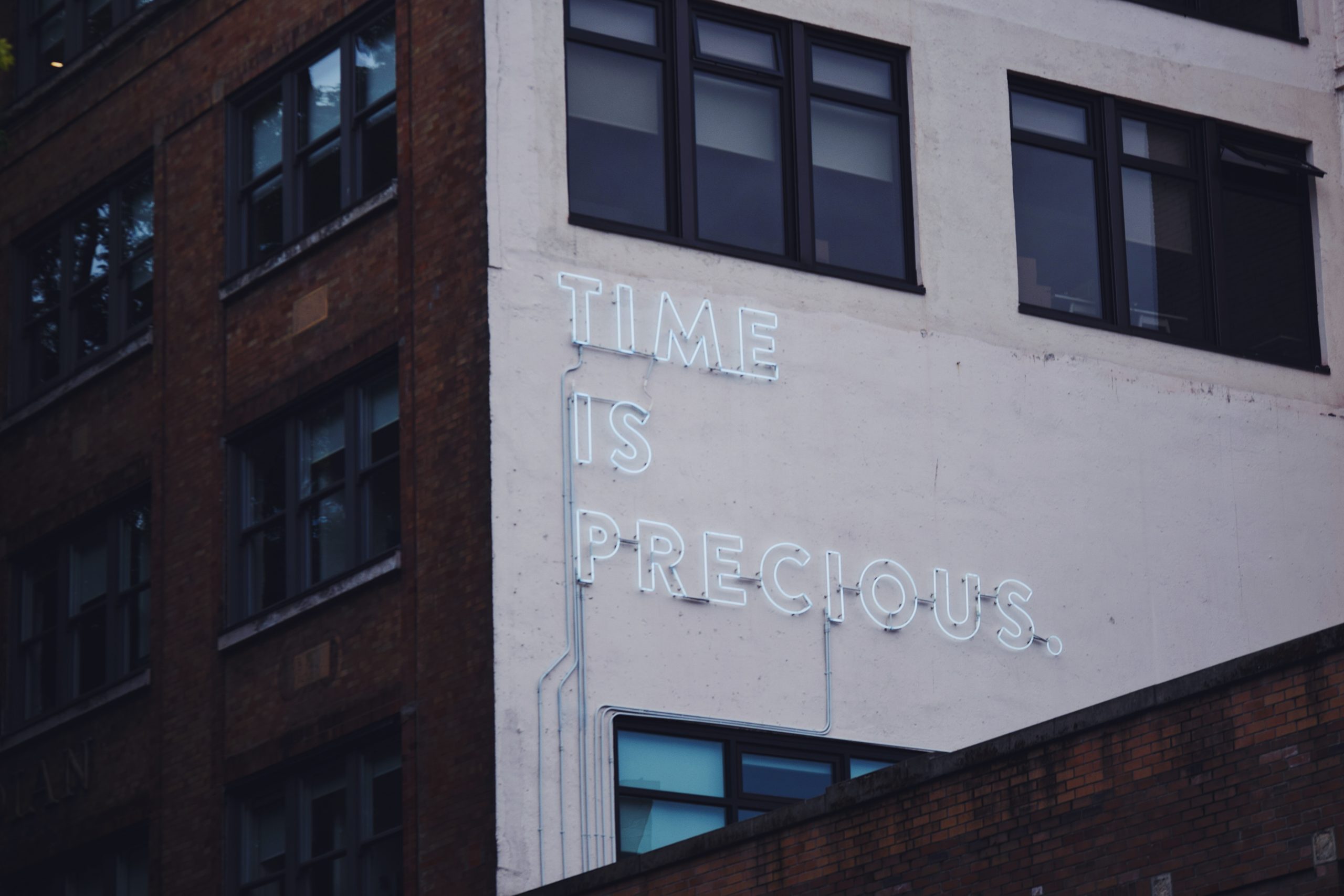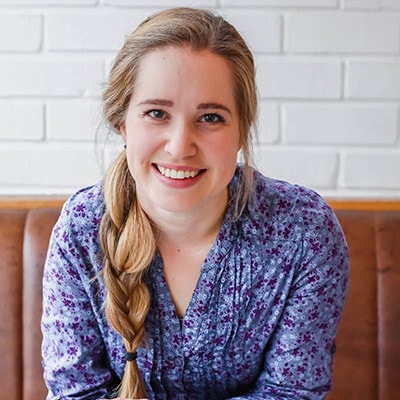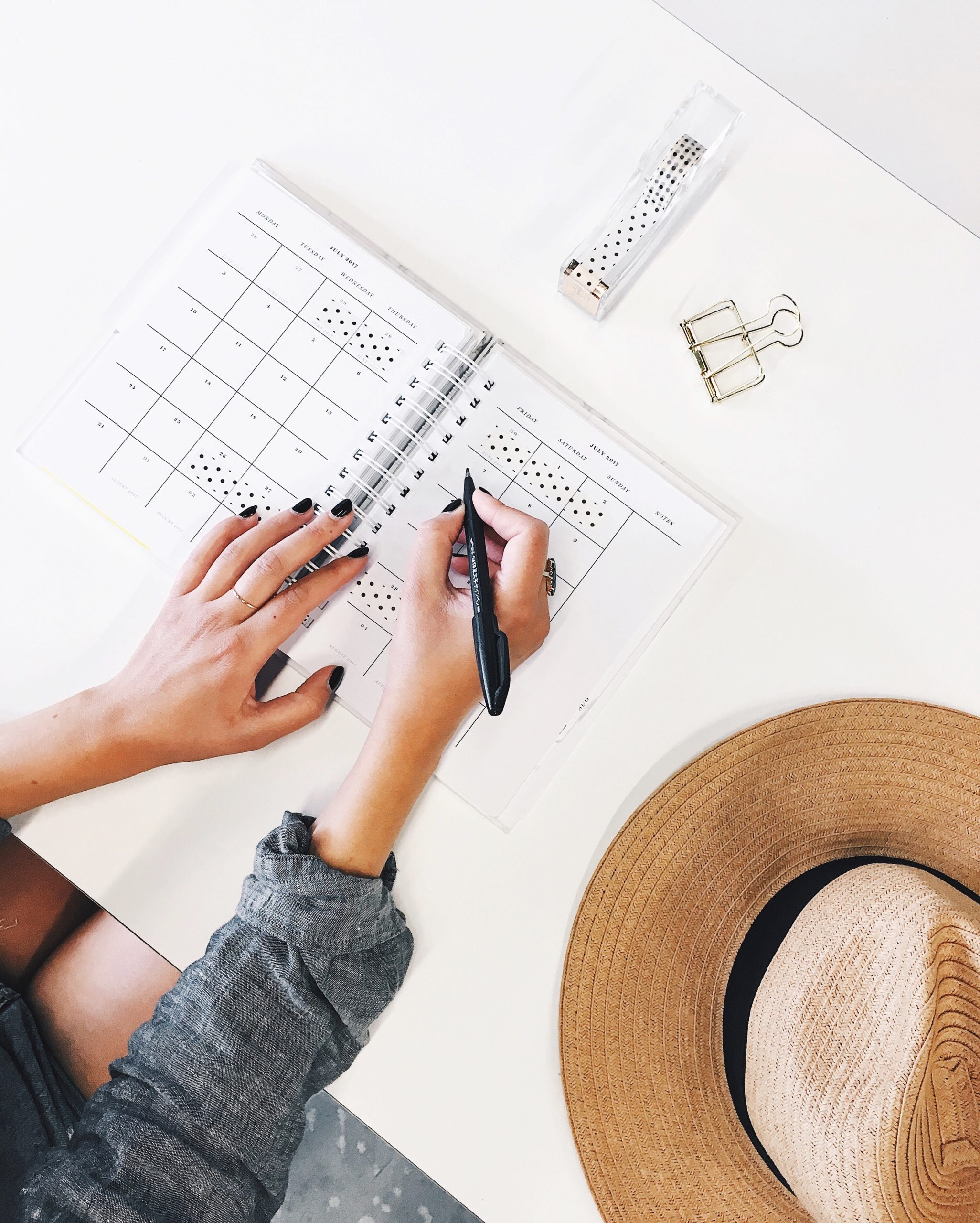Tune In to the Episode: Apple Podcasts | Spotify | Stitcher
Do you ever sense this inner battle between who you truly are and a “perfect” you that you’ve been conditioned to show up as in the world?
Maybe, inside, you feel creative, expressive, and free. But, on the outside, you’ve had to silence that “messy” part to present a more professional you to be accepted by others.
Somewhere along the way, you were taught to choose: will I be creative or will I be organized? Will I be laid back or will I be professional? Somewhere, that divide happened and you felt you couldn’t be this AND that.
The truth is, in between the black and white – in this gray area – is you. The fullness of you.
In today’s episode, we’ll flow through the integration of these opposite worlds with Beth – a Diversity, Equity, and Inclusion educator who recently decided to pivot her business from working with larger corporations to working with smaller, more creative businesses. But, once she made this decision, even more corporate opportunities came knocking at her door, which left her wondering if she’d made the right choice.
Is the Universe leading her away from her newly discovered creative self and back to her corporate self?
Together, we discover just how living in the gray area can be an integration of both versions of herself when we release the idea that if you’re one thing, you can’t be another.
Let’s dive in.
Listen to the episode below:
This episode discusses topics like…
- How to know where the Universe is guiding you
- How your upbringing and observations can teach you to be your “acceptable” self
- Where the idea of “perfect” comes from
- Being worthy of love and acceptance simply for being, not because of your actions
- The key to fulfilling work lies in identifying what inspires joy
- Feeling guilt around self-care and worthiness
By the way, I created an entirely free, 5-day at-home digital retreat called Limitless Entrepreneur. It’s all about creating a new income stream in less than a week, as well as reprogramming the beliefs that are keeping you from a no-limits business and life. Click the image below to sign up, it’s free!
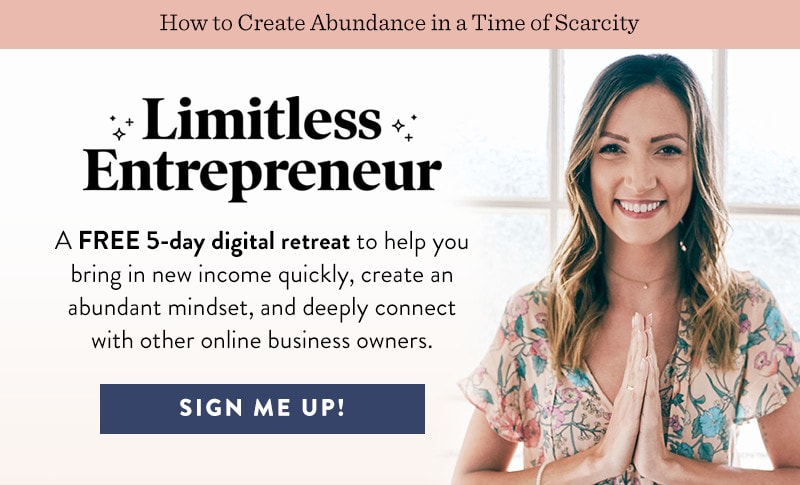
Links from the episode:
Discover Your Money Magnetism Archetype – Take the Quiz!
Register for the free, at-home Limitless Entrepreneur retreat here!
Follow me (Melyssa Griffin) on Instagram for honest conversations about business, mindset, and my life.
Follow the Limitless Life™ Podcast on Instagram for new episode releases and wisdom on how to live a life with no limits.
Learn about the Bold Abundance Mastermind.
How to subscribe + review:
Want to be the first to know when new episodes are released?
Also, podcast reviews are pretty darn important to the iTunes algorithm and the more reviews we receive, the more likely we’ll be able to get this podcast and message in front of more people. I’d be extremely grateful if you left a review right here letting me know your favorite part of this episode.
Share on social?
Did this episode help you expand what’s possible for your life or business? Do you think your social media followers may learn something, too? I’d be forever grateful if you shared it on social media. 🙂 If you do, tag @melyssa_griffin and @limitlesslifepodcast so I can repost you! Woohoo!
I’d love to hear your thoughts on this episode.
If you were to show up as your authentic and expressive self, what would that look like? Need a little help? Ask yourself: “As authentic as I know how to be, what would that look like?“
Thank you SO much for being here, sweet friend. I’m honored to walk this journey with you. See you in the next episode!
xoxo
Melyssa
Melyssa
I love to just have a free flowing conversation and see where the wind blows us. But I love to have a topic or a theme or something to start with. So, is there something that feels present for you that you want to talk about?
Beth R.
Yes and it’s the same thing I talked to you about before where I made the decision to pivot my business in another direction. But once I made that decision, business, the way that I used to do it is now just knocking my door down. So, I’m moving my business from more of supporting corporations and doing corporate work, to now really supporting creators and online business owners and helping smaller businesses be more inclusive. But once I made that declaration to the universe, I told my team, I’m starting to set everything up, I am getting more corporate inquiries than I’ve ever had. And so, the question is, “Is the universe playing a joke on me? Is this a test? Am I making the right decision by changing my business?” So those are those are the questions I have.
Melyssa
What an interesting predicament, I love the questions you’re already asking yourself of like, why is this being put in my path versus just accepting it all and sort of going back on the thing that meant a lot to you. You’re looking at it and understanding why. So what is it about working with corporate clients that you wanted to get away from?
Beth R.
Well, you know, I left corporate America, because I had spent 20 years in that arena, and it was just putting on the suit every day. And the way that you have to present yourself. So even working with organizations, corporate organizations, I feel like I’m still operating in that vein, I’m just doing it for myself instead of doing it for another organization. And so the thought of working, being able to fully live in the creative part of me, and being able to work with others who are also just as creative and to align and to vibe that way, it excites me.
Melyssa
That makes perfect sense. And how was your experience working in corporate? Did you enjoy it? Was it something you’re glad you escaped from?
Beth R.
I will say this, I am thankful that my career allowed me to take care of my family. But I never have a desire to be in corporate again. I you know, there’s a lot of red tape. There’s a lot of bureaucracy, there’s a lot of favoritism and who you know, when there’s a lot of, you know, scratching to get your way to the top, and there’s not as much flexibility, right. And so, just in the year and a half that I’ve been a business owner, the freedom I have, the flexibility I have to be a good mother, to be good to myself, to be a good daughter, you know, my parents are aging, and so even just to be a good daughter to them, I could never give this up.
Melyssa
So why are you attracting so many corporate clients? What is it about what you’re embodying?
Beth R.
I think because I’m still… that’s a funny question. Because my daughter even said to me the other day, she’s like, “You’re so professional. Like when you write me text messages, it sounds like you’re talking to somebody at work.” So I probably am still carrying myself that way. A little.
Melyssa
That’s so interesting. And do you notice yourself carrying yourself that way, in the way that you message your services and your business?
Beth R.
Yeah, I mean, now that you’re asking me that, absolutely.
Melyssa
What does it look like when you carry yourself like a almost corporate professional in your business?
Beth R.
Very put together. very organized. No faults, no mistakes. Very about business. Yeah, I think that’s it.
Melyssa
Okay. Are you seeing where there’s this disconnect?
Beth R.
Yes. Absolutely.
Melyssa
What would it look like if you were embodying this creative, flexible, small business owner that you want to attract?
Beth R.
Yeah, I mean, I think I would be more down to earth. More transparent with the mistakes that I’ve made or the things that I’m, you know, the challenges that I’m having. You know, I get the comment a lot from people when they first meet me, they think, Oh, I thought you were like, Can I curse?
Melyssa
You can say whatever you want.
Beth R.
Okay, thank you. They say “Oh, when I first like met you, or saw you, I thought you were a bitch. Or you know, you have like this, you know, serious…” you know, and I feel like I’m the friendliest person in the world. But I do hear from people that don’t know me that sometimes I can be unapproachable and I don’t feel as you know, as friendly just from first glance.
Melyssa
And do you notice that in yourself, or is it something that you’re unconscious of when you’re meeting people?
Beth R.
I think I’m unconscious of it. You know, I always say I’ve never met a stranger. So I chat with everyone. I talk to everyone, and they engage me back. But I don’t think I realize what they’re thinking, you know, what their thoughts are? How I’m perceived by them.
Melyssa
It almost feels like there’s these two Beth’s: there’s the one that you feel on the inside, that’s this happy, joyful, has-never-met-a-stranger, creative, flexible, almost free spirit. And then this other side. And I see that in you, by the way. It’s not just inside of you. But there’s this other side that other people see. Or maybe people when they visit your website, see or when they first meet you that they see. And it’s this more corporate buttoned up inflexible, structured type of person.
Beth R.
Yeah, I can see that. I was in the insurance industry for 20 years. And that’s basically been my main career path up until now. So that’s really all I know, when it comes to the world of work. That’s, I could see how I’ve built that up.
Melyssa
And do you feel like it’s possible you were even like that before entering corporate America? That maybe it was some level of defense?
Beth R.
Maybe? I might need to think on that for a moment.
Melyssa
Yeah, because what might be the fear behind people seeing you messy, imperfect, not organized, not put together? Making mistakes? What are you afraid they might feel or notice?
Beth R.
The first thing that comes to mind is will they find me trustworthy? You know, I’m talking about really serious issues in my business. And if I’m if I’m not put together, can I still be seen as the expert? I think the other thing that comes up for me, is, you know, that wanting to be liked, and wanting to be loved.
Melyssa
Can you tell me more about that one?
Beth R.
Yeah, you know, I want everyone to like me. I want everyone who, whose path I cross, who sees me from the stage or who sees me, you know, sees me on social media. I want them to have positive feelings about me, I want them to like me. When I’m the type of person who when I, you know, get an assessment or something, or I get feedback, I will ignore the 99% positive words and I will obsess over the 1% of critique that I receive.
Melyssa
Why is it so important that people not just like you, but love you?
Beth R.
I don’t know. That’s a really hard question. Because I, I don’t feel like I’ve encountered too many people who I felt didn’t like me. So that’s a hard question to answer.
Melyssa
Was there a time when you were really young, when… it doesn’t even have to be that someone didn’t like you, but that you didn’t measure up or that someone was critical of your natural way of being?
Beth R.
You know, I think about the transition between elementary school and middle school. And, you know, in elementary school, we’re all friends. Everyone likes each other. We all get along and then Middle School, it just changes and I remember my whole friendship group changing from that transition. The people that I was friends with in elementary school, I was no longer close with maybe except for like, one. I do think about that a lot. Transitioning from middle school to high school and how I was part of the nerd group, but I was happy with that I was okay with that. Um, but, you know, there was some time also during that transition where like, I had started to gain weight. And so, there, you know, there were a lot of comments and things like that. And then I think probably the third thing would be just like not really dating that much during, like, in my adolescent years before I went to college. I liked a lot of people, but a lot of it wasn’t reciprocated. So I mean, it could maybe stem from from some of that.
Melyssa
That’s really helpful. So in that time of the elementary to middle school transition, can you share more of what happened? Was there a situation that unfolded? How did the friendship sort of dissolve?
Beth R.
It was kind of where the people who I was friends with, they were more mature.
Melyssa
What does “mature” mean?
Beth R.
They knew more things about the world than I did. Both my parents are ministers. I grew up in a very religious household. I didn’t even listen to non-Christian music until high school. Didn’t watch any movie over pG 13. So I think when that transition happened, they were again, kind of more worldly, like, they knew more about the world. And so it was kind of like they moved on and I didn’t move with them.
Melyssa
How did you cope with that?
Beth R.
I think I found people who were my people, people that were at the level that I was.
Melyssa
I’m curious about that moment of when you started realizing that they were moving on.
Beth R.
Well, there’s one situation, you probably cannot post this. I remember we were in the cat school cafeteria. And it was like the group of girls that I was friends with. And they were like, hey, Beth, they were like, have you ever? I’m sorry. They’re like, have you ever been? Have you ever been eaten out? And I was like, Oh, yeah, I eat out all the time. Like, I had no idea what they were talking about. And I just remember them, like laughing and like, Oh, you know, and I was just like, you know, that’s one that is one memory that does kind of stick out to me. So sorry. It’s kind of gross, but
Melyssa
I’m sure they have never been eaten out when they were twelve. And what did that make you feel like when you were in that situation?
Beth R.
I felt dumb. How did I not realize the intent behind their questioning?
Melyssa
It almost seems like this feeling of them turning on you. They’ve noticed that you’re different and now they’re using it against you.
Beth R.
Yeah, it did. That’s a good way to describe it.
Melyssa
Which can be really hard when you have these best friends who all of a sudden seem like frenemies.
Beth R.
Right. Absolutely.
Melyssa
You mentioned that your parents are both ministers and you grew up in a really religious household. Do you see that affecting this pattern at all of wanting to be loved or liked?
Beth R.
Yes, absolutely. I think that there’s a pattern of I wanted to be that perfect Christian. I think the way I was raised was like, “Hey, you’re striving towards this perfect image of a person that, in reality, you will never reach.” We’re never gonna be perfect. But that’s kind of that mindset that I still see coming across is like, “Hey, you’re striving for this perfection. And it’s not good. It’s not okay to make mistakes.”
Melyssa
What kind of messages Did you receive whether they were verbally or just by observation of how you need it to be perfect?
Beth R.
Yeah, I mean, I’ll give you an example. There was a minister in our church who he and his girlfriend ended up getting pregnant. And they had to stand in front of the church and apologize to all of us. Because he was a leader and had apologized for this sin. And that’s kind of the the theme. If you do if you do something that’s considered a sin, it’s bad. You need to apologize. You need to atone for it. Right. Or you’re not living that true Christian life.
Melyssa
How old were you when you watched that?
Beth R.
Oh, I was probably 10.
Melyssa
Do you remember how you felt?
Beth R.
At the time I think I felt I didn’t. I think I just felt it was normal, right? Because that’s what I was used to. But, you know, then, you know, I got pregnant myself out of wedlock, at 30. And like, the first thing my mom said to me was, “Beth, we didn’t raise you this way.” And I’m thinking, “I’m 30 years old.” So, yeah, it still comes through.
Melyssa
Did that this almost, culture of perfection? How did that affect you as a kid? How did you show up in school or with your friends?
Beth R.
I mean, I hid so much from my parents. I experienced sexual assault when I was 17. And I did not tell my parents until I was 40. I think I was even at 40 still afraid of how they would respond to it, even though it wasn’t something that I did per se.
Melyssa
What was the fear that whole time of how you thought they would respond?
Beth R.
It happened in my in the home that I grew up in, you know, and so I think I had fears around. Well, why did you let that like, why did you even let him in? You know what I mean? And that was, that was, those were questions I had to deal with for myself as well. You know, I spent decades carrying the guilt around of that. So I think that was part of it. Right? Like, well, what could you have done for this not to happen?
Melyssa
Do you still feel that way?
Beth R.
No. Fortunately, I freed myself from that. I’ve forgiven him to the best of my ability, not in person, but just I’ve released all of that. It was so heavy. We could do a whole ‘nother call on that. But I did. I did release all of that.
Melyssa
Good. Yeah, that feels heavy. And what was that conversation like with your parents when you actually did have it?
Beth R.
Um, well, I actually, I wrote a book. And I described that scene in the book. And so the book was coming out. And I remember this, clearly, we were coming back from Disney World for my daughter’s birthday trip. And I said, and she was sleep. And I just said, Guys, I have something to tell you. You know, it’s getting ready to come out in this book. And I want you to know, and so I told them, and their response was completely different from you know, they were like, man, we wish you would have told us sooner. You know, um, you know, we’re so sorry that you had to, you know, carry that burden by yourself. So it was completely different than what I thought it was going to be. But it went well.
Melyssa
That’s always so interesting. The expectation versus what ends up being the reality of it. So just some reflections of what I’ve heard you say so far. One is that you hid a lot from your parents and almost your parents being this archetype of perfection and how you have to be in the world, and you hiding and escaping in a sense from that, while simultaneously being in school and feeling like, not quite enough, not mature enough, not worldly enough. And going through these transitional experiences of your friends, not becoming people that you can trust, that there’s this almost like, feeling of being on edge, like you get really close to some people, and then they might turn on you not even just leave, but actually make you feel stupid. And different. And do you think these experiences have sort of alchemized and culminated in this feeling in business of, well, I’m going to be this Teflon. I will deflect anything that feels bad that where I don’t feel like I’m seen or loved, so I’m going to be the perfect version.
Beth R.
Yeah, I mean, I didn’t think so before today, but yeah, no, absolutely. Um, I, yeah. I mean, I even thinking about service I give, you know, I’ll work till eight or nine o’clock at night. You know, even thinking about the pricing that I charge. I know, I’ve underpriced underpriced my services before. And I think it’s just because yeah, I don’t want to do anything that would cause someone to dislike me.
Melyssa
Yeah. It’s almost like “I will deny my own needs, even for the sake of making sure other people like me. And shift into a box to if I have to.”
Beth R.
Absolutely. Hundred percent.
Melyssa
And that works really well in corporate America. I mean, yeah, not all corporate offices, but the ones that you’re describing. Yes.
Beth R.
Absolutely. Yeah.
Melyssa
Yeah. Yes. And yeah. And now you’re recognizing your true essence, which is this creative. I think the first call that we had way back when you had purple hair, too, and like, you have this very creative essence. That isn’t the buttoned up. Perfect organizational kind of person. I’m sure you have all of those qualities, too. But yeah, there’s this part of you that is different. And that that’s actually a really amazing quality that you have, and kind of this maybe internal battle between the perfection that you’ve always known is the way to get love and then this creative free spirit on the other side.
Beth R.
I’ve only just started describing myself as creative. Maybe within the past year, I’ve always been like, I’m logical. I’m type a creative didn’t even seem like it was a part of my description.
Melyssa
That’s fascinating. How would you have previously described creative people?
Beth R.
Artists. I think I attached it to what they did as opposed to who they were.
Melyssa
Did you have any negative connotations with creative people? versus logical people?
Beth R.
Maybe not negative, but just maybe kind of like okay, they go over there. And I’m over here with my type a people. And when we need you creative people will tap you, but just stay over there until we need you.
Melyssa
What comes up for me when I hear you say that is almost this compartmentalizing of who you are, too, that you can’t simultaneously be the logical and creative person, you can’t simultaneously serve corporate america and creative small business owners. It has to be this one or the other kind of scenario, which continues to put the power in other people’s hands. Because it’s, it’s never about your integration and embodiment of all of your wholeness. It’s about all of these compartments outside of you. Does that make sense?
Beth R.
Oh, absolutely. I’m a person of extremes. So that makes perfect sense to me that it’s like, Am I being the corporate person today? Or am I being the creative person today? That makes perfect sense.
Melyssa
A person of extremes. That’s such an interesting way to describe yourself. What does that what does that mean to you?
Beth R.
I’m either hot or cold, right? Like, I either love something or I absolutely hate it. Like, I go from one end to the other. So I mean, I think even in this instance, even in this situation we’re talking about it’s like, Alright, well, I’m, I’m changing my focus. So I’m now going to get rid of all corporate facing material, right? I’m not going to, like I’m not going to be on LinkedIn anymore. Like, I totally have drawn that line of like, Alright, let’s get rid of everything that’s corporate. So we can just focus on this piece over here.
Melyssa
Yeah, it’s like this feeling of let’s just burn it all down. Because that’s me. any part of it still exists, that it just doesn’t make sense. If I’m going to look in this other direction.
Beth R.
That’s me. After a relationship ends, you will see no evidence that they were ever in my life. Everything is gone. I know I’m giving you like 15 topics to talk about.
Melyssa
Oh, I love it. It’s so wonderful. You’re so open. Yeah, burn it all down.
Beth R.
That’s right. That’s me.
Melyssa
In relationships, what’s the benefit of burning down the evidence that they ever existed?
Beth R.
Gives me a clean start. It takes away that gray area. You know, sometimes it’s like, oh, well, will they? Or won’t there? You know, do we leave the door open? It’s like, nope, door shut, clean cut. Let’s move on to the next.
Melyssa
I think you just summarized the theme of this conversation. You said, “It takes away the gray area.” I think that speaks a lot to me about everything that we’ve been flowing through. Because I think the gray area is you. It’s the integration of these opposite worlds that you’ve been a part of in your life and these varying characteristics and qualities you have, instead of this sort of abandonment of, well, if I’m this thing, then I cannot be that other thing. And if I grew up this way, then I have to hide it and go in this totally opposite direction. And I think the gray areas can be really scary. Because there’s nothing to hold on to. It’s kind of like you’re floating in space instead of standing against a wall. And for someone who has this deep desire, like all of us to be loved and liked, it can be really scary to be in the gray because it means you’re just rooted in whoever you are. And it doesn’t matter how other people are around you. How does that link for you?
Beth R.
I definitely like to know what’s going to happen when it’s going to happen, how it’s going to happen, what the impact is, how it will affect me how I need to prepare, what’s the plan B? C? D? So yes, so being in the gray does doesn’t feel good, because I can’t control it.
Melyssa
And maybe when you think about yourself being in the gray of your qualities that you’re creative and logical, instead of needing to float between the two. Instead of thinking, I can’t control it, it’s like I can’t control how other people experience me. Mm hmm. Right now You’re in polar opposite. And it feels like there’s a sense of control, because you can find the people who will resonate with that very distinct quality and way of being.
Beth R.
Yes. If I’m buttoned up corporate, I know what I need to do to wow the crowd. If I’m in my creative, free, you know, with friends really is kind of have shown myself so far, then I know how to wow the crowd. Either way, I know how to wow the crowd. And I, that’s my goal.
Melyssa
What if you could wow the crowd by just being whoever you are, without thinking of the circumstance or audience? But just showing up fully as you?
Beth R.
I’m still not able to accept that. We talked about that recently, you know, with people saying, oh, my goodness, like, you’re, you have so much light. And you just, when you walk into the room, I see it, I feel it. And I’m just the fact that it’s just for existing, I can’t accept that. It has to be tied to some value that I gave you. It’s really hard for me to just accept that just for existing.
Melyssa
Thank you for sharing that. What is the resistance of that say? If it could talk? What would it say?
Beth R.
I think it’s two things. The first is I think it deals with worthiness. And the second thing is, I always strive for humility. And that probably also goes back to the Christian upbringing, too. It’s not a good thing to you know, to beat to brag, right? Like, we’re the we’re only supposed to brag about God. So I think that’s part of it, too, is like I always try to be humble. And, like, I used to have a horrible time doing self assessments at work. bragging on myself, I was no good at that. So I think it’s a mix between that the worthiness and then the humility.
Melyssa
Can you tell me more about the worthiness piece?
Beth R.
I don’t know if this is going to come up the way I want it to. But part of me is like, you’re just, you’re an average person. Like, there’s no need for you to be celebrated and lauded. I look at some of my heroes, like Oprah, or Michelle Obama, or you and I’m like, you know, you’re not on that level. You don’t deserve this to be celebrated. You know, you haven’t done the things they’ve done. So it sounds like I mean, I guess I’m still attaching it to the, the value the worth of doing something.
Melyssa
Yeah, of doing something. Instead of just being something
Beth R.
Yeah, that’s, that doesn’t even feel comfortable. Saying.
Melyssa
So you could be worthy just for being
Beth R.
Yeah. Yeah. That doesn’t feel comfortable.
Melyssa
Doesn’t feel comfortable. How does it feel then? If it’s not comfortable.
Beth R.
it feels wrong. It feels wrong. I don’t even know how to describe it.
Melyssa
Simple, in a way?
Beth R.
Maybe. Lazy is maybe a word that comes to mind. Like you’ve got to work for that. You can’t just walk in the door and be that. You haven’t put in enough hours. You haven’t put enough sweat equity. You haven’t worked hard enough for that yet.
Melyssa
Will there ever be a point where you have worked hard enough to be worthy?
Beth R.
No, I don’t think I think I keep this mindset. Probably not because I’m, you know, I’ll still be thinking, Okay, well, then what do I need to do for the next level on the next level on the next level? Yeah, yeah, definitely. I definitely. Like don’t relish in a win. It’s like, all right. Oh, my God, we got this win. All right. Let’s go to the next like, what do we What’s next? So yeah, I have a hard time being and not doing.
Melyssa
I noticed, like in the mastermind, you’ll talk about, and even just before this call, you were talking about how you’re going to take the rest of the day off, you’re going to rest you’re gonna take a bath, and prioritize your self care. And I noticed you talk about that in the mastermind. Is that something you do often? Or is it something that I just happen to notice? For whatever reason?
Beth R.
I try to take a few moments of self care every day. So I try to meditate or journal or read every day. But if you would ask me to take like a day off and not work. I can’t tell you when it’s the last time I’ve done that.
Melyssa
Your daughter’s name is Isabella? Bella. Do you only love her when she’s doing something?
Beth R.
Absolutely not.
Melyssa
Why do you love her when she’s not doing anything productive?
Beth R.
Because of who she is. She’s my daughter, my child. She’s the most important person in the world to me. So it doesn’t matter what she does, who she is what she does wrong, or what she does, right? I love her.
Melyssa
Would it be possible for you to extend that same unconditional love and grace to the child inside of you?
Beth R.
It would be nice. It would be nice. I wasn’t gonna cry, Melyssa.
Melyssa
Crying is good. What are you feeling?
Beth R.
Even in this moment, I’m feeling guilt for not treating myself that way. Yeah, I think I can focus on that. That unconditional love.
Melyssa
The guilt is not you. The guilt is the conditioning, the upbringing the “this is wrong.” But you are the same as Bella. Deserving of the same love just for existing. I’m sure she feels that same way about you. I’m sure she probably loves it when you’re not doing anything
Beth R.
She does. She talks about how much I work and how I’m a workaholic. So I’m trying to work on that for her.
Melyssa
Because she loves you so much when you’re just being together.
Melyssa
Well, going back to your original question of why are all these corporate clients reaching out to me? As soon as I make this declaration that I’m done with them? What now? Maybe has entered your awareness about that situation?
Beth R.
A few things. I think, you know, the first is it doesn’t have to be either or. I think it has to be what fits, and what fits could look different doesn’t have to be from one extreme to the next.
Beth R.
And then I think the second thing that is coming to mind is just being more conscious of how I show up. And, you know, the good thing is, I’m getting my website redone. So this is a perfect time to have this conversation, just to make sure that I’m showing up authentically. And realizing that the people who are drawn to me are drawn to me that I don’t have to force it just be who I am. And the people who are supposed to be are supposed to come to me will.
Melyssa
So the first one that you said about doesn’t have to be extremes of small businesses, creative people or corporate, that maybe there could be some variation. What’s a word or a mantra or something that you can come back to when a client reaches out to you? And you want to feel into: Is this client, regardless of where they work, are they an ideal fit for me?
Beth R.
What I’m thinking is, will this assignment give me joy?
Melyssa
Love that. Will this assignment give me joy. Because is it possible that a corporate client could reach out to you and it could light you up and feel joyful?
Beth R.
Yeah.
Melyssa
Beautiful. I love that. And is it also possible that you showing up to corporate clients office or doing a zoom call with them or something and showing up in your full expression could bring value to the conversation?
Beth R.
Yeah, definitely. It definitely to be unexpected. To drive conversation and and drive everyone else, encourage everyone else to be authentic.
Melyssa
When you’re working with corporate clients, is it about diversity and inclusion? It’s so fascinating too that you’re teaching about diversity, and including people of all backgrounds and yet hiding this part of yourself. So it seems almost like the perfect topic to really just show up fully.
Beth R.
Yeah, I mean, it sure enough could weed out people that wouldn’t bring me joy. I’ve thought like, I want to get like a nose ring. Just a cute little, you know, jewel. But I’ve been like, will that deter a corporate client from working with me? And so if that’s something that I do, and I show up authentically, then if some if that let someone make the decision that they don’t want me to do the work for them. They’ve kind of looted themselves out.
Melyssa
Yeah, kind of feels like, if somebody’s going to hire a DEI educator, and they’re not going to like them because they have a nose ring, then they’re probably not a good fit to do that kind of work anyways.
Beth R.
You’re probably right.
Melyssa
That’s a good way to weed people out. So if you were to show up fully, you and authentic and expressive, what would that look like? What would you be embodying? And how would you actually look physically?
Beth R.
It’s such a hard question.
Melyssa
Is it hard? Because you’re passing it through the filter of, will they like this?
Beth R.
I think it’s hard partly because I don’t know that I know what that fully authentic, who that fully authentic person is. I’ve never walked in it.
Melyssa
Let’s say, as authentic as I know how to be right now. What would that look like?
Beth R.
I probably be wearing my hair scarves. And a nose ring,
Melyssa
Which looks fabulous, by the way.
Beth R.
Thank you. Um, and you know, maybe get some tattoos. I would be more assertive in calling things out, I think. So even talking about certain topics, I think I’m not as assertive as I can be. Because again, they still have to, you know, so I think if I was fully authentic, I would like call out some bs that I hear. Instead of maybe pacifying it. I think I would put more. I’m trying to think of the right word, I would be freer. So taking time off, not taking calls after a certain time. I wouldn’t say yes to everything. Oh, well can you do this? Can you do that? Can you do this? This? That’s like, yeah, I can I can do all of that. I think that’s what I’ve got so far.
Melyssa
I’m going to read your list back to you.
Melyssa
So you’re going to show up in your hair scarves with tattoos and a nose ring. And you’re going to be assertive in calling things out. Instead of just letting them slide. You’ll be freer. Because you’ll have more time off and clear work hours instead of just saying yes to everything. And then generally you won’t say yes to everything. Mm hmm. Yeah, this looks like embodiment and alignment to me.
Beth R.
I was worried if it it still sounded more if it still sounded corporately.
Melyssa
There will still be those corporately remnants, I’m sure but this sounds like you. Yeah, integrating this with who you already are. Sounds like you.
Beth R.
I like it.
Melyssa
And what would be the benefit for you in showing up this way, in your life and with your clients?
Beth R.
I just think I feel lighter. Not having to wear different masks. Just being able to be myself. You know, I think more family time obviously and it’s interesting, I think that I will feel more like a CEO, more like a leader than I do now. Because I’d be like, this is who you get, take it or leave it. Yeah.
Melyssa
So lighter, able to be yourself, a CEO, and leader ,and more time with your family. That sounds like a pretty ideal life.
Beth R.
I think so.
Melyssa
That sounds pretty good. And, and when you’re not showing up this way, when you’re not showing up in your, the way you want to dress, you’re letting things slide instead of calling them out. You’re not feeling free, you’re saying yes to everything, even things that you don’t want to do. You’re overworking yourself. Who do you become when you embody all of that?
Beth R.
A big ball of depression and anxiety, who is not fun. I can tell with how I interact with those around me when it’s becoming too much. Because I project it off on them. And that’s not nobody wants to be around that person.
Melyssa
So you have a choice between being a big ball of depression and anxiety and not fun. or choosing to feel lighter, yourself, have time with your family and be the CEO and leader. And it’s literally just a choice. Sometimes a hard choice. Sometimes it’s so clear. Yeah, it is so clear. And it can also be challenging in the moment. Yeah. I like your mantra that you came up with earlier though. Will this assignment give me joy? And kind of feels like you could just use that for all the things. Will this blank give me joy. Will this headscarf gives me joy. Will these tattoos give me joy. Will more family time gives me joy. And just allowing the conscious choice that sometimes will take some courage to choose. Because it might be against your natural way of being that you’ve learned. But choosing to go back to who you really are. And the more you choose it, the more you become it.
Beth R.
I mean, I’m thinking like, Man, this works for relationships. This works for anything. Yeah. purchases. I’ve got it on a sticky. I’m gonna put it up at my desk.
Melyssa
I love it. And just keep choosing you. And the whole process. Thank you.
Beth R.
Thank you. I
Melyssa
We covered a lot of ground today.
Melyssa
I’m going to send this to my therapist, like here. Just listen to this before my next visit. You don’t realize something’s until you know, you’re asked a question.
Beth R.
This was good. Thank you.
Melyssa
We went in a lot of rabbit holes. I hope it was helpful.
Beth R.
It was helpful. It was helpful. I mean, I think I’ve the connection with church upbringing. hadn’t really come up before. So I’m going to take some time and journal about that.
Melyssa
I sensed that probably was a big one for the perfection piece.
Beth R.
Absolutely.
Melyssa
I would think about things you heard your parents say, or the way that they showed up things you observed and how you might be modeling that same behavior now.
Beth R.
They were very buttoned up and that’s who they were. They both work for the government. So like, put together buttoned up, don’t make mistakes. You work hard, and then you get the rewards of your work. Breaking that will be really important.
Melyssa
And healing. Just the generations to come to have your family line.
Beth R.
Absolutely. I’m already seeing pieces of that being passed down. So it’s good that I realize it recognize it and can address it.
Melyssa
That’ll be so beautiful for your daughter too.
Beth R.
Yes, absolutely. who just came in to show me her makeup earlier? So sorry about that.
Melyssa
That’s awesome. She’s so wonderful. I’m so glad I got to meet her.
Beth R.
Yes. And she’s very excited about the next trip. So if it’s in person.
Melyssa
I mean, seems like everyone was healthy. So
Beth R.
I haven’t heard of anyone have getting COVID. So I think it was a success.
Melyssa
So glad we were able to do that in person.
Beth R.
Well, thank you so much.
Melyssa
Oh, you’re so welcome. It’s so great to chat with you.
Beth R.
You too. Thank you.
